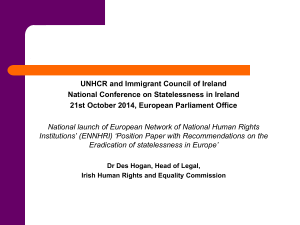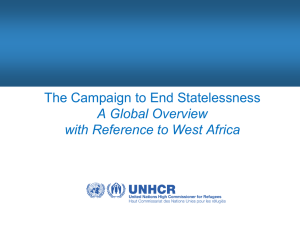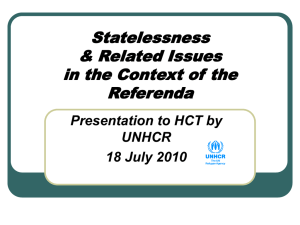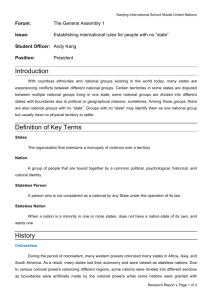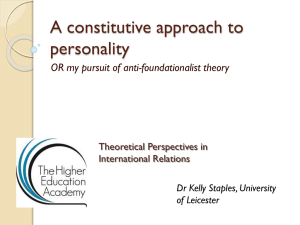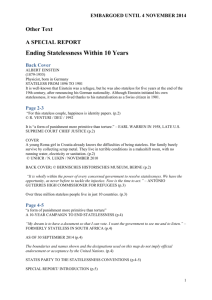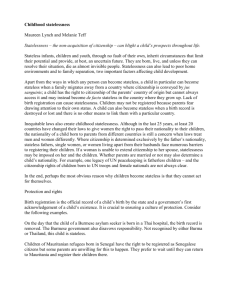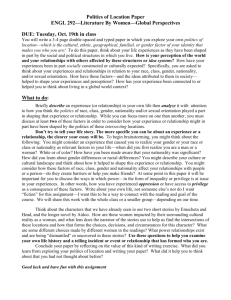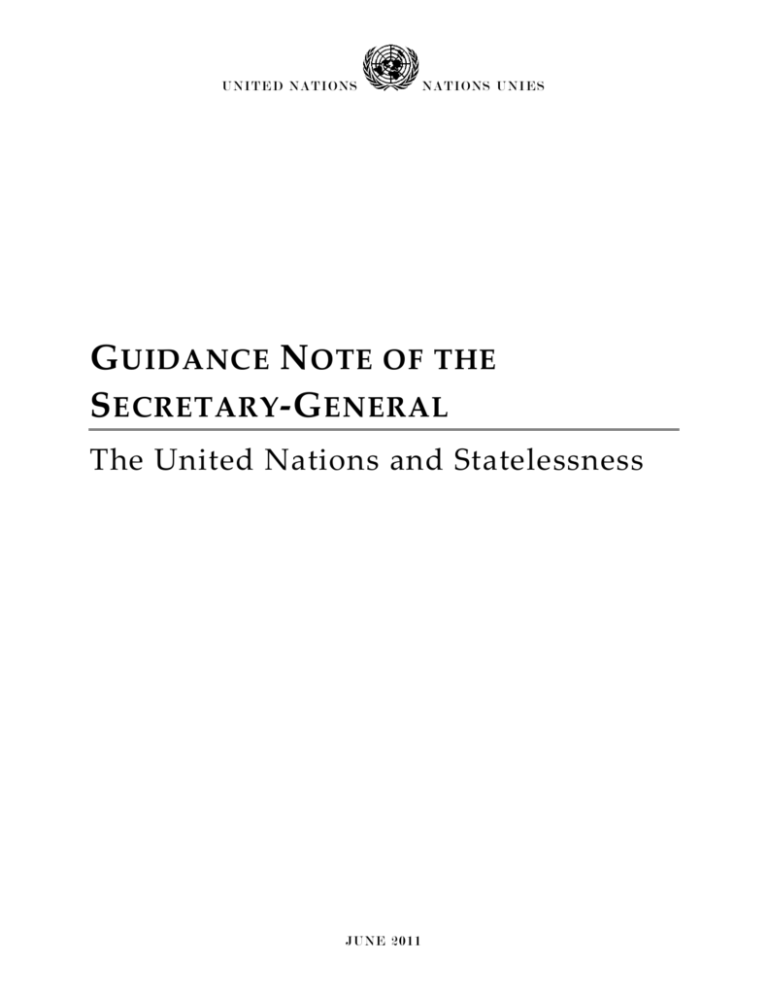
UNITED NATIONS
N A T I O N S U N IE S
G UIDANCE N OTE OF THE
S ECRETARY -G ENERAL
The United Nations and Statelessness
JU NE 2 01 1
SUMMARY
The present Note provides guidance to the UN system on addressing statelessness by
outlining the guiding principles and the policy framework for action. The UN engagement in
addressing statelessness should be guided by these seven principles that support the
development, promotion and implementation of international norms relating to statelessness.
In addition to the seven guiding principles, the Note presents four concrete interrelated action
approaches on how the UN system can improve its coordinated response to statelessness. In
conclusion, the Note suggests required institutional arrangements for various actors within
the UN system.
The policy framework for action presented in the Note is the result of an assessment of
international legal standards and the experience of the UN in addressing statelessness to date.
A. Guiding Principles
1.
2.
3.
4.
Base action on international norms and standards related to nationality and statelessness
Recognize the central role of States and work with affected populations and civil society
Promote and support action to prevent statelessness
Respect the human rights of stateless persons and provide for their specific protection
needs
5. Promote the acquisition of nationality as the primary solution
6. Recognize and redress discrimination as a common cause and consequence of
statelessness
7. Guarantee gender equality in nationality laws and their implementation to prevent
statelessness
B. Addressing Statelessness
1.
2.
3.
4.
Identification of stateless persons
Prevention of statelessness
Reduction of statelessness
Protection of stateless persons
C. UN System Arrangements
The UN General Assembly has entrusted the Office of the United Nations High
Commissioner for Refugees (UNHCR) with a mandate relating to the identification,
prevention, and reduction of statelessness and protection of stateless persons. However, this
Guidance Note affirms that all UN entities system-wide must increase their efforts to address
statelessness. The UN should tackle both the causes and consequences of statelessness as a
key priority within the Organization’s broader efforts to strengthen the rule of law.
-1-
INTRODUCTION
An estimated 12 million people are stateless worldwide. A stateless person is defined
as someone who is “not considered as a national by any State under the operation of
its law,”1 and is thus someone without any nationality or citizenship anywhere.2
Addressing statelessness is a foundational and integral part of UN efforts to
strengthen the rule of law.3 Statelessness undermines the rule of law due to both its
causes and consequences. It often arises from discrimination and arbitrary laws or
practices, and stateless persons cannot enjoy full equality with citizens in any country.
Statelessness results in widespread denial of human rights and the phenomenon of
statelessness itself violates the universal human right to a nationality. Statelessness
often leads to limits on access to birth registration, identity documentation, education,
health care, legal employment, property ownership, political participation and
freedom of movement. Women are at heightened risk of statelessness, rendering them
particularly susceptible to a range of abuse. Stateless children also suffer acute
vulnerabilities; deprived of their rights in childhood as a result of their status
diminishes their chances for better futures. The cycle of statelessness and
marginalization is difficult to break. Statelessness has a detrimental impact not only
on individuals concerned but also on societies more generally, in particular, because
excluding entire sectors of a population can create social and political tensions and
significantly impair efforts to promote economic and social development.
Action by the UN to address the causes and consequences of statelessness is an
essential component of both conflict prevention efforts as well as social, economic,
and legal development agendas. Statelessness is also often closely related to
discrimination against specific groups, including women and racial, ethnic, religious
and linguistic minorities, or on the basis of perceived national origin. Where
statelessness has been a contributing factor to conflict, initiatives to grant nationality
to stateless populations should be incorporated into programmes to restore justice and
the rule of law, including effective public administration. Acquisition of nationality by
individuals who have strong links to a State based on factors such as birth on the
territory, descent and residence is a key means of giving them a stake in society.
1
As defined in article 1(1) of the 1954 Convention relating to the Status of Stateless Persons, a
definition considered by the International Law Commission to form part of customary international
law. International Law Commission, Draft Articles on Diplomatic Protection with Commentaries,
2006, p.49. In addition to stateless persons who fall under the internationally recognized legal
definition, there are also groups and individuals who are referred to as de facto stateless persons.
While the term de facto stateless persons has been used in a variety of contexts, there is a growing
consensus that at a minimum this concept includes persons who possess a nationality but are outside
their country of nationality and unable or, for valid reasons, unwilling to avail themselves of the
protection of that country. For the purposes of this Guidance Note, all references to “stateless persons”
denote those who meet the international definition of a stateless person in article 1 of the 1954
Statelessness Convention.
2
In this Guidance Note, the terms nationality and citizenship are used interchangeably to describe the
legal bond between an individual (the national or citizen) and a State. While both terms are often used
interchangeably in public international law, it should be noted that on the national level, these terms are
often given distinct meanings.
3
The Secretary General of the UN defines the rule of law as “a principle of governance in which all
persons, institutions and entities, public or private, including the State itself, are accountable to laws
that are publicly promulgated, equally enforced and independently adjudicated, and which are
consistent with international human rights norms and standards.” Report of the Secretary General: The
Rule of Law and Transitional Justice in Conflict and Post-Conflict Societies, para. 6 (2004).
-2-
Reduction of statelessness can therefore bolster national reconciliation and help
prevent a return to conflict. When linked with efforts to address underlying societal
discrimination, UN action to resolve statelessness may also form the basis for poverty
reduction and sustainable, inclusive development.
The UN General Assembly has entrusted the Office of the United Nations High
Commissioner for Refugees (UNHCR) with a mandate relating to the identification,
prevention and reduction of statelessness and protection of stateless persons.
However, this Guidance Note affirms that all UN entities system-wide must increase
their efforts to address statelessness. The UN should tackle both the causes and
consequences of statelessness as a key priority within the Organization’s broader
efforts to strengthen the rule of law. Given the magnitude and complexity of the
problem and the damaging impact on human lives, efforts would need to be redoubled
to prevent statelessness and to address statelessness wherever it occurs, including in
States outside of UN peace and political operations. The UN, particularly UNHCR,
also needs to provide leadership in this regard and work with States, international and
regional organizations, and non-governmental organizations. This Guidance Note
outlines the guiding principles and policy framework for action to address
statelessness, including concrete activities to be undertaken and required institutional
arrangements.
A. GUIDING PRINCIPLES
UN engagement in addressing statelessness should be guided by a number of
principles that support the development, promotion and implementation of
international norms relating to statelessness. The policy framework set forth below
enunciates this set of guiding principles and is the result of an assessment of
international legal standards and the experience of the UN in addressing statelessness
to date.
1. Base action on international norms and standards related to nationality and
statelessness
Internationally agreed rules relating to the prevention and reduction of statelessness
and standards of treatment of stateless persons address many of the challenges faced
by stateless individuals. Such rules are provided by an inter-related set of norms found
in two international conventions on statelessness, a range of standards contained in
universal and regional human rights and other instruments, and customary
international law.4
The prerogative of States to determine the rules for acquisition, change and loss of
nationality is limited by international law, in particular human rights law. The
Universal Declaration of Human Rights (article 15) establishes the universal right of
every individual to a nationality, a right which has been reaffirmed by a number of
universal and regional human rights instruments, including the American Convention
on Human Rights (article 20) and the European Convention on Nationality (article 4).
As a corollary to this right, States must make every effort to avoid statelessness
through legislative, administrative and other measures.
4
An overview of the international legal framework is provided in UN Human Rights Council, Human
rights and arbitrary deprivation of nationality: report of the Secretary-General, 14 December 2009.
2009, A/HRC/13/34, available at: http://www.unhcr.org/refworld/docid/4b83a9cb2.html.
-3-
Moreover, international law, including the universal prohibition against
discrimination on account of race, colour, or national or ethnic origin as enunciated in
the Convention on the Elimination of All Forms of Racial Discrimination (article 5),
prohibits States from discriminating in nationality matters. Likewise, the Convention
on the Elimination of All Forms of Discrimination against Women (article 9)
guarantees that States parties must grant women equal rights as men with respect to
nationality. The International Covenant on Civil and Political Rights (article 24) and
the Convention on the Rights of the Child (article 7) require that States parties ensure
that children are registered immediately after birth and acquire a nationality. The
latter principles related to children’s rights are also affirmed in the African Charter on
the Rights and Welfare of the Child (article 6).
Two international conventions dedicated to statelessness complement international
human rights law, with the 1954 Convention relating to the Status of Stateless Persons
(“1954 Convention”) laying the cornerstone of the international protection regime for
stateless persons. The 1954 Convention provides the universally accepted legal
definition of a stateless person under international law, thereby establishing an
internationally-recognized status for stateless persons, extending to them specific
rights, for instance, relating to administrative assistance and issuance of identity and
travel documents. For its part, the 1961 Convention on the Reduction of Statelessness
(“1961 Convention”) sets forth practical obligations that States parties must undertake
to prevent and reduce statelessness.
One reason that efforts by the UN to address statelessness have been hampered is the
relatively low number of States parties to the 1961 Convention and the 1954
Convention.5 The UN must promote ratification/accession of these and other relevant
international treaties, including at the regional level. Additional action is also required
to ensure full implementation of treaty and other standards relating to the right to a
nationality and the human rights of stateless persons. This should include the issuance
of authoritative guidance on interpretation of key international standards, particularly
by relevant treaty bodies or other supervisory mechanisms of relevant international
instruments.
2. Recognize the central role of States and work with affected populations and
civil society
The UN must take into account that States determine the rules for acquisition, change
and loss of nationality, even if State sovereignty and prerogatives on nationality
matters are limited by international human rights norms. States generally provide for
automatic acquisition of nationality at birth based on jus sanguinis (birth to a national)
or jus soli (birth on the territory), a combination of these two principles, or later in life
on the basis of other links to the State such as residence. States can therefore prevent
statelessness through legislative and other measures to ensure that all children acquire
a nationality at birth and that individuals do not become stateless in adulthood.
Similarly, States can reduce statelessness through changes to legislation or
government policy regarding who is to be considered a national. Facilitated
naturalization for stateless persons is another means of reducing statelessness.
5
At the time of publication, the 1954 Convention had 65 States parties while the 1961 Convention had
37. Lists of States parties can be found at
http://treaties.un.org/Pages/Treaties.aspx?id=5&subid=A&lang=en.
-4-
While recognizing the central role of States, it should be borne in mind that the
affected individuals and populations must be part of all efforts to address
statelessness. First-hand information on situations is only accessible through
consultation with affected stateless persons. In some cases, stateless populations also
have the capacity to play a role in redressing their situation. For instance, provided
there is an adequate legal and administrative framework in place, stateless persons
may be able to initiate procedures to acquire a nationality. In other cases, it is not
possible for affected populations to take initiative on their own behalf without
negative, even life-threatening, repercussions.
Many activities to address statelessness require outreach to affected populations,
advocacy with all sectors of society, training and capacity-building. Civil society can
make critical contributions in this respect and partners for UN action can come from
among a broad swathe of actors, such as government offices, legal-aid networks,
women’s rights groups, national human rights institutions, NGOs which provide
development assistance as well as academia.
Although advocating for and advising on reforms of legal, administrative, and
practical obstacles that create statelessness is the primary avenue for the UN system to
address statelessness, there are situations and circumstances where States do not
express the political will to resolve the stateless status of individuals or populations on
their territory, or might even take deliberate actions to exclude stateless individuals or
populations from integrating into their citizenries. Furthermore, the increasing focus
on State sovereignty with respect to protecting national security over the last decade
has in turn tightened some States’ positions with respect to integrating migrants and
other non-citizens into their respective body politics. Where faced with such political
obstacles for addressing statelessness, the UN will need to pursue its role in
promoting the respect for human rights and other international legal obligations
related to combating statelessness and supporting civil society and other groups to
achieve that end.
3. Promote and support action to prevent statelessness
The UN should promote action by States and civil society to prevent statelessness, as
doing so offers the most effective solution by preventing the phenomenon of
statelessness from occurring in the first place. Identifying potential causes and
targeted, timely action can prevent statelessness. Once statelessness occurs it is
generally more difficult to resolve and raises additional protection needs. In many
instances, statelessness is the result of foreseeable events: most importantly, gaps in
nationality legislation that lead to statelessness at birth and failure to ensure all
persons retain or acquire a new nationality at the time of State succession. At other
times, statelessness is a result of deliberate distinctions with respect to the application
of nationality laws and policies towards certain groups or individuals. The UN should
engage with States to prevent statelessness to address both technical and political
causes of statelessness. The UN should also encourage States to grant citizenship to
those on their territory who would otherwise be stateless following State succession as
well as children born on their territory who would otherwise be stateless at birth.
Where persons have difficulties furnishing relevant proof to establish their nationality,
they are at risk of not being considered nationals by a State. These persons and/or
their descendants may therefore be at risk of statelessness. Necessary forms of proof
may either relate to the question of whether a person is a national (for instance a
national identity document or passport), or to the legal requirements which a person
-5-
needs to meet in order to be considered a national. Such requirements generally refer
to links a person has with the State.
The most important proof thus relates to place of birth and to parentage. These facts
are recorded through birth registration, underscoring the reason why universal birth
registration is crucial in realising the right to a nationality.6 The UN should therefore
work with States to ensure that adequate birth registration, civil registration and other
documentation systems are in place at the country level and develop national capacity
for effective public administration in this regard, thereby permitting individuals to
prove their identity and links to one or more States.
4. Respect the human rights of stateless persons and provide for their specific
protection needs
Universal human rights standards apply irrespective of possession of a nationality,
with only a very limited set of rights reserved for citizens.7 But stateless persons have
protection needs distinct from those of other non-citizens. Stateless persons require
support in areas where a State of nationality would generally take action, for instance
in relation to the issuance of identity and travel documents. Stateless persons who do
not enjoy the right to return to and reside in another State should be granted residency
and concomitant civil, political, social, economic and cultural rights and have a
realistic prospect of acquiring the State’s nationality in the future. Stateless persons
are also uniquely vulnerable to prolonged detention and States should be sensitized to
respect the rights of stateless persons to be free from arbitrary detention as a result of
their stateless status.8
A prerequisite for the protection of stateless persons is ensuring that the State can
identify who is stateless and who is not. States are encouraged to establish formalized
statelessness determination procedures with due process safeguards for individuals to
claim protection as a result of their statelessness status. This is particularly relevant in
the migratory context (i.e. where stateless individuals are outside of their country of
habitual residence).
Most stateless persons reside in the country of their birth or a successor State. But
statelessness might result in forced displacement, in particular where it results from
arbitrary deprivation of nationality, and many stateless persons do in fact cross an
international border and become refugees. When stateless persons are simultaneously
refugees, they must be treated as such and afforded the protection foreseen under
international refugee law, specifically under the 1951 Convention Relating to the
Status of Refugees and its 1967 Protocol and the prohibition of non-refoulement in
customary international law.
The grant of leave to reside within a State and related rights to stateless persons as set
out above do not resolve their situation entirely as they are unable to enjoy rights
reserved for nationals. Consequently, these protections should be viewed as a
temporary solution until such time as the individuals concerned are able to acquire a
nationality.
6
See CRC, Article 7.
See OHCHR, The Rights of Non-citizens, 2006.
8
In this context, it is also important to note that de facto stateless persons face many of the same
protection risks faced by stateless persons. Their situation is akin to that of stateless persons in that
there is no State that will provide them with protection. Consequently, it is recommended that the
States in which they find themselves extend protection to them until such time as they are able to avail
themselves of the protection of their State of nationality.
7
-6-
5. Promote the acquisition of nationality as the primary solution
The acquisition of a nationality is the only solution to statelessness as full enjoyment
of all human rights is generally only possible when an individual possesses a
nationality. In particular, nationality brings with it access to political participation, the
full right to residence within a State’s territory, and also a sense of identity. Stateless
people can overcome many of the problems they face once they possess a nationality.
Enabling stateless persons to acquire a nationality is a foundational step towards legal
empowerment to pave the way for their full enjoyment of all civil, political,
economic, and social rights.
Solutions to statelessness generally depend on political will and capacity. This flows
from the fact that only States can grant nationality. The will to act may be a
significant challenge where statelessness is linked to discrimination. Attitudes which
have led to the exclusion of a population must be overcome. Decision makers need to
be convinced that the integration of stateless populations will be a positive step. Lack
of capacity can play a role where State authorities wish to address problems related to
statelessness but do not have the expertise or resources to do so. The UN should
therefore highlight the positive effects for States to reduce statelessness by granting
citizenship to stateless persons, stressing the detrimental impact statelessness has on
individuals, communities and society as a whole. To address capacity deficits, the UN
must stand ready to provide technical and practical assistance to States which decide
to take action on statelessness.
6. Recognize and redress discrimination as a common cause and consequence of
statelessness
Discrimination on the basis of racial, ethnic, religious, linguistic and presumed
national origin is often a root cause of statelessness. Given that possession of
nationality generally brings with it political rights, governments or political parties
may question whether certain individuals or groups “belong” to the country, notably
in the context of political tension or upcoming elections. Where persons lack
documentation to prove their nationality, discrimination can be a decisive factor in
leading the State to the conclusion that the person is not a national.
Marginalization and discrimination in turn, tend to be further aggravated because of
statelessness. The UN needs to take action to resolve the social and economic
exclusion of stateless persons by, for example, including such persons in education,
health and poverty reduction programmes. Socio-economic integration of stateless
persons enhances opportunities for legal integration through acquisition of a
nationality.
7. Guarantee gender equality in nationality laws and their implementation to
prevent statelessness
Further work is necessary to overcome persistent obstacles for women to enjoy equal
rights as men regarding citizenship matters. Contrary to international human rights
standards such as those set out in the ICCPR and CEDAW, the laws of numerous
States continue to contain gender-discriminatory provisions and this renders women
and their children more susceptible to statelessness. For example, statelessness can
result where women do not have equal rights with men to acquire, change or retain
-7-
their nationality.9 Even when they are gender neutral, the application of nationality
laws can result in statelessness among women as a result of patterns of discrimination
in society which negatively impact access to nationality procedures, access to the
justice system and issuance of relevant documentation. Gaps in nationality laws
which may lead to statelessness upon change of nationality also have a
disproportionate impact on women because they are more likely to renounce their
previous nationality and seek to acquire the nationality of the husband upon marriage.
Furthermore, the nationality laws of at least 30 States retain provisions which
discriminate against women with regard to conferral of nationality upon their
children.10 In the absence of any safeguard, statelessness results from such provisions
when the father is a non-national and he is stateless himself, cannot confer nationality
under the law of his State, or is unable or unwilling to fulfil any bureaucratic
requirements for acquisition of nationality by his children.
To break the cycle of statelessness, the UN should increase efforts to guarantee
gender equality in nationality laws and protect against the particular vulnerabilities of
women and children to statelessness as a foundational part of its efforts to combat
statelessness to promote the rule of law. As mentioned above, international human
rights instruments offer specific guarantees for women to have equal nationality rights
as men and obligations to prevent statelessness among children.11 Concerted efforts
by the UN system should be undertaken to realize these rights and respond to the
specific protection needs of stateless women and children.
B. ADDRESSING STATELESSNESS
The UN system can improve its coordinated response to statelessness by undertaking
four interrelated action approaches, including:
(1) identification of stateless persons;
(2) prevention of statelessness;
(3) reduction of statelessness; and
(4) protection of stateless persons.
These avenues of action derive from guidance issued by the UNHCR’s Executive
Committee12 and are endorsed by the UN General Assembly. Though directed at
States and UNHCR, this structured approach to addressing statelessness serves as a
useful point of reference for other UN entities engaged in addressing statelessness.13
Each of these actions is described in further detail below.14
9
As a result, article 9(1) of the CEDAW establishes that “States Parties shall grant women equal rights
with men to acquire, change or retain their nationality. They shall ensure in particular that neither
marriage to an alien nor change of nationality by the husband during marriage shall automatically
change the nationality of the wife, render her stateless or force upon her the nationality of the
husband”.
10
This is addressed by article 9(2) of the CEDAW which sets out that “States Parties shall grant
women equal rights with men with respect to the nationality of their children”.
11
CRC, Article 7; 1961 Convention, articles 1 and 4; African Charter on the Rights and Welfare of the
Child, article 6; American Convention on Human Rights, article 20; European Convention on
Nationality, article 6.
12
Executive Committee of the High Commissioner’s Programme, Conclusion No. 106 (LVII) – 2006
on Identification, Prevention and Reduction of Statelessness and Protection of Stateless Persons of
2006.
13
The UNHCR Executive Committee therefore highlighted the importance of cooperation between
UNHCR and various UN agencies.
14
Additional guidance can be found in UNHCR Action to Address Statelessness: A Strategy Note,
available at http://www.unhcr.org/4b960ae99.html.
-8-
1. Identification of statelessness
The identification of statelessness is a prerequisite for any response strategy.
Successful identification involves a comprehensive analysis of a given statelessness
situation, through the following activities:
•
Analysis of legal and political frameworks related to nationality and
statelessness of the State to which the relevant stateless person has links (e.g.
through descent, birth, territory or residence);15
•
Support for data collection through census, surveys or administrative records
(e.g. civil status registries) so that information on statelessness can be
captured;
•
Gathering and analyzing data directly from stateless populations or those at
risk of statelessness, e.g. problems related to documentation, education, health
or security (taking into account diversity within a population, notably age and
gender), and capacities of the community to tackle such problems; and
•
Awareness-raising on the definition of statelessness and assistance to State
institutions to devise and implement statelessness determination procedures.
2. Prevention of statelessness
Statelessness can be prevented by effectively addressing its causes in the following
areas:
•
Strengthening the international legal framework: The UN should increase
efforts to promote ratification/accession to the 1961 Convention, which has
only 37 States party as at 1 January 2011. In doing so, reference may be made
to relevant resolutions of the General Assembly which have repeatedly
“encourage[d] States that have not done so to give consideration to acceding”
to this Convention.16 States should also be encouraged to ratify or accede to
and improve implementation of other international and regional human rights
instruments that affirm the right to a nationality and a child’s right to be
registered immediately after birth and to acquire a nationality.
•
Correcting gaps in nationality legislation: The UN must proactively identify
gaps in legislation and propose necessary amendments. The standards
contained in the 1961 Convention, international human rights laws and
regional treaties should be promoted. This is particularly important when new
or revised nationality legislation is introduced, notably upon State succession.
Comprehensive guidance on the attribution of nationality in situations of State
succession is contained in the Draft Articles on the Nationality of Natural
Persons in Relation to the Succession of States of the International Law
Commission. Constitutions may also contain relevant provisions with respect
to nationality, and the Guidance Note of the Secretary-General on United
Nations Assistance to Constitution-Making Process should be used as a guide.
15
A 2008 UNHCR publication provides guidance for such analyses, Statelessness: An Analytical
Framework for Prevention, Reduction and Protection, 2008, available at:
http://www.unhcr.org/refworld/docid/49a28afb2.html.
16
See General Assembly Resolution 64/127, 63/148, 62/124, 50/152 and 49/169. See also numerous
Conclusions of UNHCR’s Executive Committee including Nos. 106, 102, 99, 95, 90, 87, 85 and 78.
Human Rights Council resolutions on human rights and arbitrary deprivation of nationality13/2, 10/13
and 7/10.
-9-
Legal advice can help States transpose international standards into national
legislation.17 The key standards to prevent statelessness include:
Grant of nationality to children born in territory if they would otherwise be
stateless;18
Grant of nationality to children born to a national abroad if they would
otherwise be stateless;19
Presumption that foundlings are nationals;20
Providing that as a general rule, loss and deprivation of nationality should not
result in statelessness;21
Providing that voluntary renunciation of nationality shall not be permitted if it
results in statelessness;22
Equality between men and women with regard to acquisition, change and
retention of nationality and conferral of nationality on children.23
•
Improving institutional capacity to document the civil status of individuals:
Where persons are at risk of statelessness due to lack of evidence of
nationality, support for the development of national capacity to provide
effective public administration, in particular national registration and
documentation services should be offered. Particular emphasis on improving
birth registration is critical in this regard. Creative approaches, such as through
mobile registration units, or registering births and civil status in conjunction
with other national campaigns, such as public-health inoculation drives, should
be pursued. Through capacity-building and training, competent courts and
administrative authorities are in a position to accurately confirm whether a
person is a national, ensuring that all those who have acquired a nationality
under the legislation of a State are recognized as nationals in practice.
Working with the judiciary can also enhance the interpretation and application
of nationality legislation in line with international standards so as to prevent
statelessness.
•
Empowering individuals: People must be aware of their rights and related
procedures on acquisition of nationality by their children, protection against
loss and deprivation of nationality and access to identity and nationality
documentation. Public information and education campaigns are important
activities in this regard and some individuals may require legal assistance in
order to avail themselves of such rights and procedures. Civil society plays a
critical role, for instance, by highlighting the importance of birth registration
and assisting parents to secure birth certificates for their children through
17
When doing so, it is important to note that these standards neither require a generalized grant of
nationality based on birth in the territory (jus soli) nor the acceptance by States of dual/multiple
nationality.
18
1961 Convention on the Reduction of Statelessness, article 1, African Charter on the Rights and
Welfare of the Child, article 6, American Convention on Human Rights, art. 20, European Convention
on Nationality, article 6.
19
1961 Convention on the Reduction of Statelessness, article 4.
20
1961 Convention on the Reduction of Statelessness, article 2.
21
1961 Convention on the Reduction of Statelessness, articles 7 and 8.
22
1961 Convention on the Reduction of Statelessness, article 7.
23
CEDAW, rticle 9 and ICCPR articles 23(4), 24(3) and 26.
- 10 -
subsequent (late) registration. Civil society actors can also assist individuals
with procedures for confirming their nationality with administrative authorities
or courts, for instance with the filing of applications, obtaining supporting
documentation or paying direct and indirect costs.
•
Combating discrimination: In order to avert risks of statelessness, a critical
step is to promote international standards on non-discrimination, and to raise
awareness of the consequences of statelessness, both for the individual and
society as a whole. Such activities can also be closely linked to conflict
prevention and peace building.
3. Reduction of statelessness
Activities for the reduction of statelessness primarily aim at promoting the acquisition
of a nationality. This can be through large-scale citizenship campaigns or
individualized naturalization procedures. The following activities are relevant in this
context:
•
Advocating for access to citizenship for stateless populations: Political will is
a decisive factor in finding a solution to statelessness situations, in particular
those of a protracted nature. Raising awareness of statelessness, its
consequences, and the right to a nationality in addition to offering advice and
support are key to generating such political will. While decisions on
nationality are generally taken at a high political level, advocacy should be
directed at all stakeholders who influence, or are affected by, political
decisions. The stronger the public support for, and the lower the resistance
against, integration of stateless people within the broader population of
citizens, the easier it is for political leaders to decide upon and implement
solutions.
•
Implementing legislative solutions: Acquisition of nationality by stateless
persons may require amending nationality legislation in order to establish
more inclusive rules on who is to be considered a national. Such legislation
can be applied by operation of law (automatically), thereby avoiding costly
procedures which may serve to exclude certain individuals. Similarly,
legislation on naturalization should foresee facilitation of requirements for
stateless persons, for instance through reduced residence requirements and
lower fees. Expert advice on comprehensive and just solutions may need to be
provided in this regard and national capacity strengthened to formulate and
implement legislative solutions.
•
Supporting institutional responses: Capacity-building and training assist
States to reform administrative practices that impede the acquisition of a
nationality. This can relate to discrimination against certain applicants in
proceedings or lack of awareness of statelessness and existing methods to
facilitate acquisition of nationality. Citizenship campaigns should be
undertaken once legal or political reforms are achieved, that would allow large
numbers of stateless persons to acquire a State’s nationality. Such campaigns
help identify individuals who qualify for acquisition of nationality, process
their applications and issue nationality documentation. Given the
marginalization of many stateless populations, mobile teams need to raise
awareness in cooperation with civil society or through building capacity of
administrative authorities.
- 11 -
•
Empowering individuals: The establishment of legal services for poor and
marginalized stateless persons, as well as public information and education
campaigns, are essential to ensure that stateless persons are aware of
nationality and documentation procedures and are able to avail themselves of
them. For example, NGOs can assist stateless persons in completing
applications for acquisition of nationality, gathering relevant supporting
documentation and also providing financial support for fees or necessary
travel. Where such applications are rejected, assistance to file an appeal with a
court can be critical.
•
Promoting social and economic inclusion of formerly stateless populations:
Acquisition of nationality cannot undo the effects of statelessness overnight.
Where efforts to reduce statelessness are successful, further action should be
taken to ensure that new citizens are aware of their rights and responsibilities
and of the procedures to avail themselves of services which had not been
accessible to them before. Issuance of nationality documentation is critical to
the enjoyment of rights attached to nationality. Development programmes in
relevant countries should consider including formerly stateless populations
among the groups requiring specific attention. Depending on the situation,
activities in various sectors could be needed, for instance: vocational training
where stateless people had been barred from formal employment or access to
housing where they were not able to acquire property or obtain a construction
permit. Lastly, there may be a need for peace-building activities between
communities if there was strong resistance by some segments of society to
integration of the formerly stateless population.
4. Protection of stateless persons
Protection of stateless persons comprises all the activities that address problems
stateless persons face in their daily lives.24 Stateless person are marginalized and often
face difficulties in accessing education, health care or formal employment. They are
also subject to abuse, discriminatory treatment, arbitrary detention, and risk falling
victim to crimes like trafficking. Whenever possible, interventions to protect stateless
persons should be undertaken within a broader strategy to prevent and reduce
statelessness, in particular since acquisition of a nationality empowers stateless
persons to improve their daily lives on their own.
•
Strengthening the international legal framework: The UN should increase
efforts to promote ratification or accession to the 1954 Convention which has
only 65 States parties as at 1 January 2011. In doing so, reference may be
made to relevant resolutions of the General Assembly which has repeatedly
“encourage[d] States that have not done so to give consideration to acceding”
to this Convention.25 Furthermore, States should be encouraged to accede to
and improve implementation of other international and regional human rights
instruments that enhance the protection of the rights of stateless persons.
•
Developing national legal frameworks and supporting institutions:
Irrespective of whether or not the State is party to the 1954 Convention, the
UN should encourage States to incorporate a definition of statelessness in line
with the international definition into national legislation. Legislation
24
25
As understood in the context of UNHCR’s Executive Committee Conclusion No. 106.
See resolutions referred to in footnote 13, above.
- 12 -
governing the entry and residence of non-citizens should take into
consideration the specific situation of stateless persons, particularly those who
are outside their country of habitual residence. The UN should also promote
and provide advice on laws and regulations establishing a formalized
procedure, and where applicable, the creation of institutions, for determining
who is stateless on a territory. States should grant the individuals, who are
confirmed to be stateless through such determination procedures, the right to
stay on their territory, as well as concomitant civil, political, social, economic
and cultural rights if they do not have the right to return to and reside in
another State.
•
The UN should promote respect of international human rights standards visà-vis stateless persons: While some distinctions between nationals and nonnationals are permissible under international law, authorities must be made
aware of their duty to guarantee the rights of all persons within their territory
or under their jurisdiction, including stateless persons. Training should inform
authorities dealing with stateless persons about statelessness and its
consequences and the importance of non-discrimination. Training of law
enforcement agencies and courts helps to ensure that rights of stateless persons
are respected and enforced where necessary, for instance to prevent trafficking
of stateless persons. Exchanges between stateless people and public authorities
can be organized to highlight specific difficulties that stateless people face in a
country. UN agencies should ensure that their own and their partners’ policies
and programmes reflect that some persons in the country of operation have no
nationality and may therefore need specific attention and should generally not
be excluded on the basis that they are foreigners.
•
The UN should assist with capacity-building and training to assist
authorities to be able to identify stateless persons and extend treatment in
accordance with international standards: Authorities dealing with assessing
the nationality of persons within the territory must be made aware of the
existence and consequences of statelessness and the importance of accurately
assessing nationality status. Good cooperation between countries facilitating
exchange of information with full respect for the rights of the individual is
essential. Training on determining nationality should also extend to courts
deciding nationality claims. Authorities and courts responsible for decisions
on the status of aliens should be made aware of how the situation of stateless
persons, including de facto stateless persons, can be addressed in the national
legal system in a manner consistent with international standards.
•
Empowering stateless persons through legal assistance and integration
programmes: Stateless persons must be aware of their rights and may require
practical or legal assistance with, for example, nationality verification
processes. Any programmes to assist local populations with access to
education, health care or income-generation should, where possible, also
include stateless populations. Such socio-economic integration of stateless
persons helps to create political will for achieving full integration through the
acquisition of a nationality by lowering the political stakes for such a decision.
Where possible, activities should also consider how integration can promote
acquisition of a nationality, for instance by helping stateless persons to fulfil
requirements for naturalization. For example, language classes not only help
stateless persons improve their interactions with authorities generally but also
- 13 -
to pass language tests which may be pre-requisites to the acquisition of
nationality. Similarly, livelihood generating activities not only improve the
daily lives of stateless persons and their families, but also help them meet
naturalization requirements related to a stable income.
C. UN SYSTEM ARRANGEMENTS
The UN supports Member States in addressing situations of statelessness as integral to
its efforts to strengthen the rule of law at the national and international levels. The
expertise and activities of numerous UN departments, offices, funds, agencies and
programmes are relevant to address situations of statelessness, including its causes
and consequences. Involvement of a broad range of UN entities is required to address
the problem effectively together with States, other international and regional
organizations, NGOs, and community-based organisations.
As noted above, UNHCR has a specific mandate entrusted to it by the General
Assembly in 1995 to prevent and reduce statelessness and protect stateless persons.
This global mandate complements UNHCR’s role as the UN agency responsible for
assisting individuals and States to resolve the situation of individuals under the 1961
Convention on the Reduction of Statelessness.
At the same time, effectively addressing statelessness requires a collaborative effort,
and the mobilization and coordination of the requisite expertise. All UN agencies that
work with stateless populations can address protection concerns in their respective
sectors. Below is a non-exhaustive list of such areas as well as an indication of some
of the relevant agencies, apart from UNHCR:
•
creating political will to address statelessness (Department of Political Affairs
(DPA)/Department of Peacekeeping Operations (DPKO)/UN Country Teams);
•
procedural and substantive advice in peace negotiations and electoral systems
and processes, to seize opportunities to reform relevant nationality laws and
policies (DPA/DPKO);
•
promoting the prevention and reduction of statelessness as an element of good
governance, the rule of law, and access to justice (United Nations
Development Programme);
•
ensuring that national laws and policies on citizenship respect international
law (Office of Legal Affairs);
•
ensuring that national laws and policies respect international human rights
related to nationality (Office of the High Commissioner for Human Rights,
including human rights treaty bodies and special procedures);
•
child protection, including the improved respect for the right of every child to
acquire a nationality (United Nations Children's Fund);
•
gender equality to ensure that women enjoy equal rights as men with respect to
nationality laws and policies (UN Women);
•
collection and analysis of population data to improve identification of stateless
persons and populations (United Nations Population Fund, United Nations
regional economic commissions); and
- 14 -
•
promotion of enhanced public information and awareness campaigns to
address statelessness (Department of Public Information).
At the Headquarters level, cooperation between UN entities can be coordinated with
the support of the Rule of Law Coordination and Resource Group, chaired by the
Deputy Secretary-General and supported by the Rule of Law Unit in the Executive
Office of the Secretary-General.
At the country level, the UN Country Teams provide the appropriate framework for
coordination between UN entities dealing with statelessness with a lead responsibility
exercised by UNHCR under its mandate. Cooperation and coordination under the
Common Country Assessment (CCA), the UN Development Assistance Framework
(UNDAF) and Delivering as One initiatives as well as host government-led national
development strategy frameworks (e.g. Poverty Reduction Strategy Papers (PRSP’s),
Post-Conflict Needs Assessments (PCNAs), etc.) are of relevance, particularly
because addressing statelessness is frequently linked to development programmes.
- 15 -

